argparse vs docopt vs click vs fire C’est CLI qui gagne ? Soirée des communautés rennaises Jean-Luc Tromparent Luc Sorel-Giffo
A presentation at Soirée des communautés Rennaises in April 2023 in Rennes, France by Jean-Luc Tromparent

argparse vs docopt vs click vs fire C’est CLI qui gagne ? Soirée des communautés rennaises Jean-Luc Tromparent Luc Sorel-Giffo

Command Line Interface une IHM qui remonte aux années 60 une IHM de choix pour du tooling IT avantages : rapidité d’usage (mémoire musculaire) composabilité (scripting) simplicité de développement

Définition d’une grammaire $ gliss Usage: gliss list gliss create <title> [—description=<description>] [—priority=<priority>] gliss show <issue-id> gliss close <issue-id> gliss comment <issue-id> <comment> gliss assign <issue-id> <assignee-name> respect des conventions (POSIX…) des arguments et des options logiques et intuitifs auto apprentissage avec l’aide intégrée

gliss - another gitlab CLI $ gliss —help gliss - Command Line Interface to interact with GitLab Issues. Usage: gliss list gliss create <title> [—description=<description>] [—priority=<priority>] gliss show <issue-id> gliss close <issue-id> gliss comment <issue-id> <comment> gliss assign <issue-id> <assignee-name> Options: -h —help Show this screen. -d —description=<description> -p —priority=<priority> Description of the issue. Priority of the issue. Valid values are “Low”, “Medium”, “High”.

Le vétéran du circuit : argparse inclus dans la librairie standard depuis python 2.7 recommandé dans la documentation python (vs getopt et optparse)

gliss-argparse.py import argparse parser = argparse.ArgumentParser(description=’Command Line Interface to interact with GitLab Issues.’) subparsers = parser.add_subparsers(title=’Commands’, dest=’command’) # List issues list_parser = subparsers.add_parser(‘list’, help=’List all issues’) # Create new issue create_parser = subparsers.add_parser(‘create’, help=’Create a new issue’) create_parser.add_argument(‘title’, help=’Title of the issue’) create_parser.add_argument(‘-d’, ‘—description’, help=’Description of the issue’) create_parser.add_argument(‘-p’, ‘—priority’, choices=[‘Low’, ‘Medium’, ‘High’], default=’Low’, help=’Priority of the issue’) # Show issue details show_parser = subparsers.add_parser(‘show’, help=’Show details of an issue’) show_parser.add_argument(‘issue_id’, type=int, help=’ID of the issue’) … args = parser.parse_args() print(vars(args))
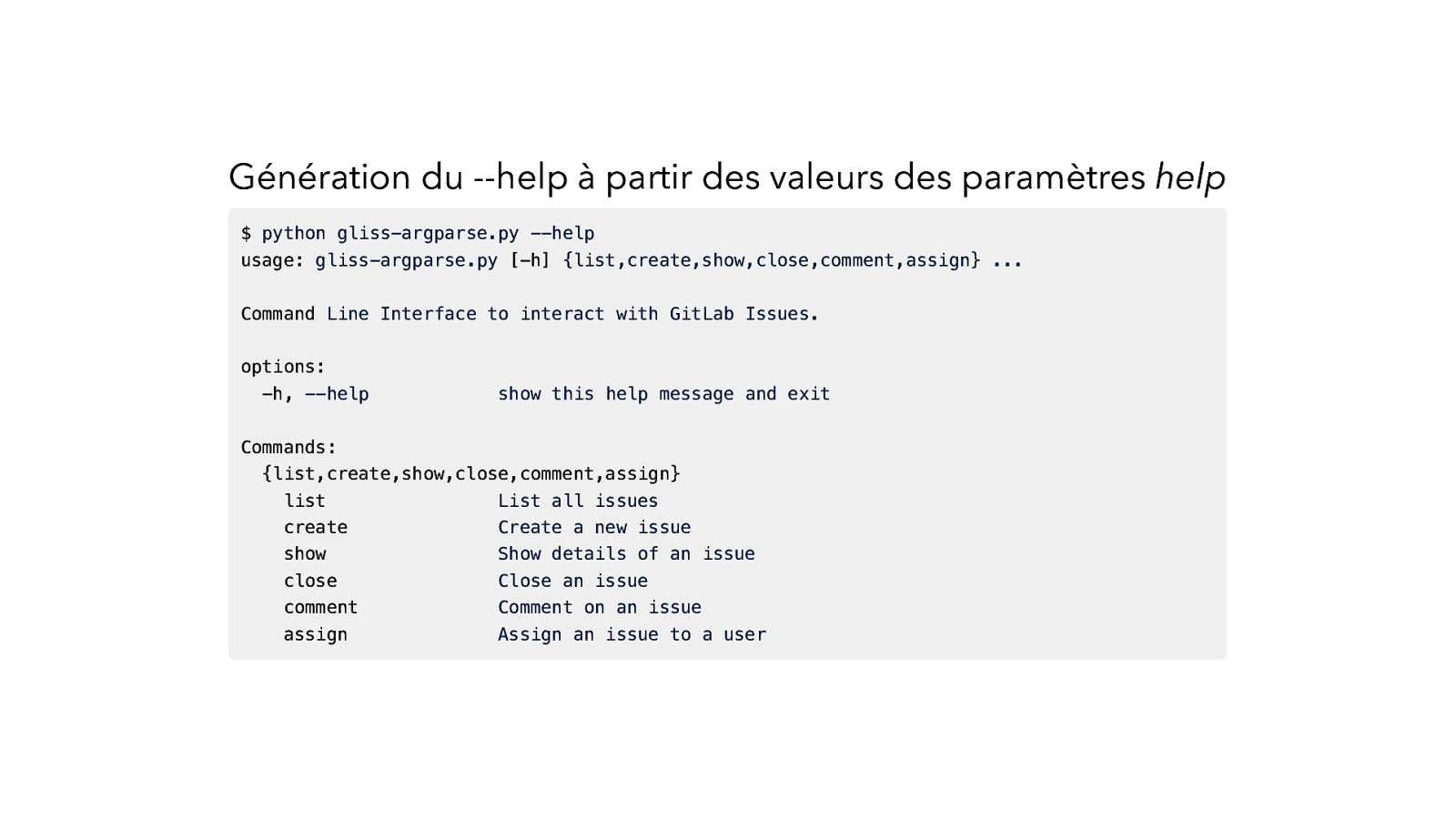
Génération du —help à partir des valeurs des paramètres help $ python gliss-argparse.py —help usage: gliss-argparse.py [-h] {list,create,show,close,comment,assign} … Command Line Interface to interact with GitLab Issues. options: -h, —help show this help message and exit Commands: {list,create,show,close,comment,assign} list List all issues create Create a new issue show close Show details of an issue Close an issue comment assign Comment on an issue Assign an issue to a user
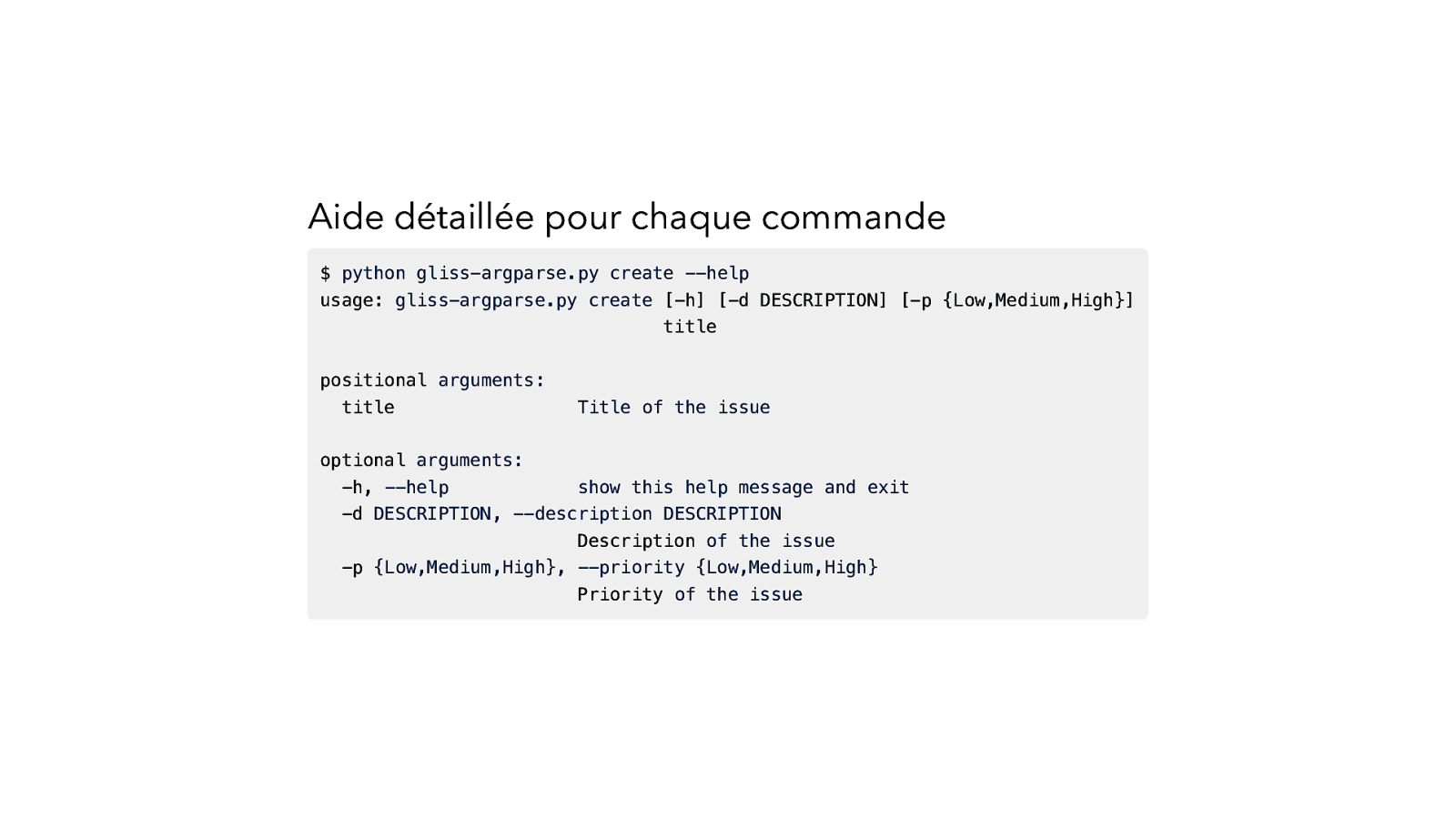
Aide détaillée pour chaque commande $ python gliss-argparse.py create —help usage: gliss-argparse.py create [-h] [-d DESCRIPTION] [-p {Low,Medium,High}] title positional arguments: title Title of the issue optional arguments: -h, —help show this help message and exit -d DESCRIPTION, —description DESCRIPTION Description of the issue -p {Low,Medium,High}, —priority {Low,Medium,High} Priority of the issue
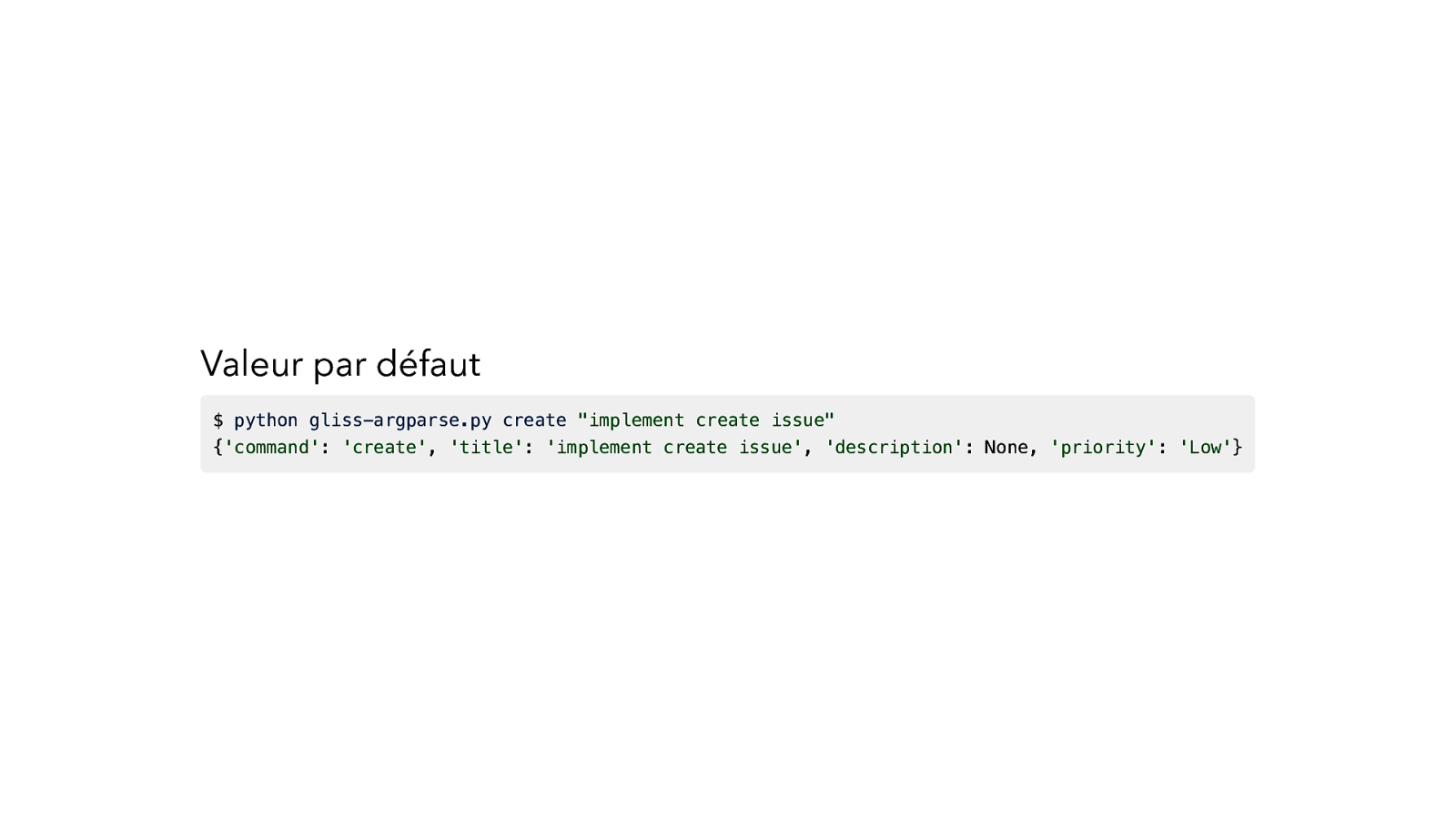
Valeur par défaut $ python gliss-argparse.py create “implement create issue” {‘command’: ‘create’, ‘title’: ‘implement create issue’, ‘description’: None, ‘priority’: ‘Low’}
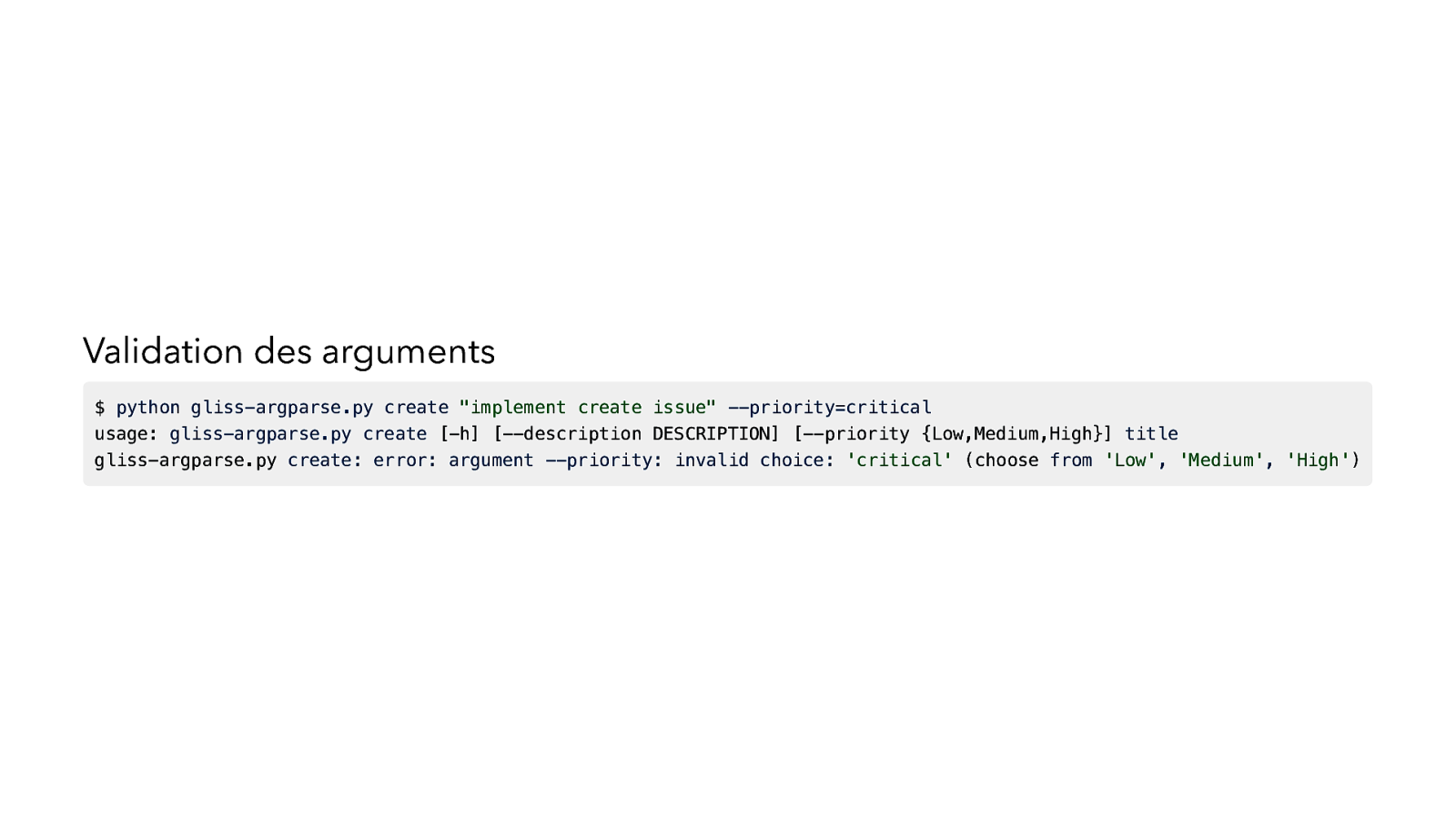
Validation des arguments $ python gliss-argparse.py create “implement create issue” —priority=critical usage: gliss-argparse.py create [-h] [—description DESCRIPTION] [—priority {Low,Medium,High}] title gliss-argparse.py create: error: argument —priority: invalid choice: ‘critical’ (choose from ‘Low’, ‘Medium’, ‘High’)
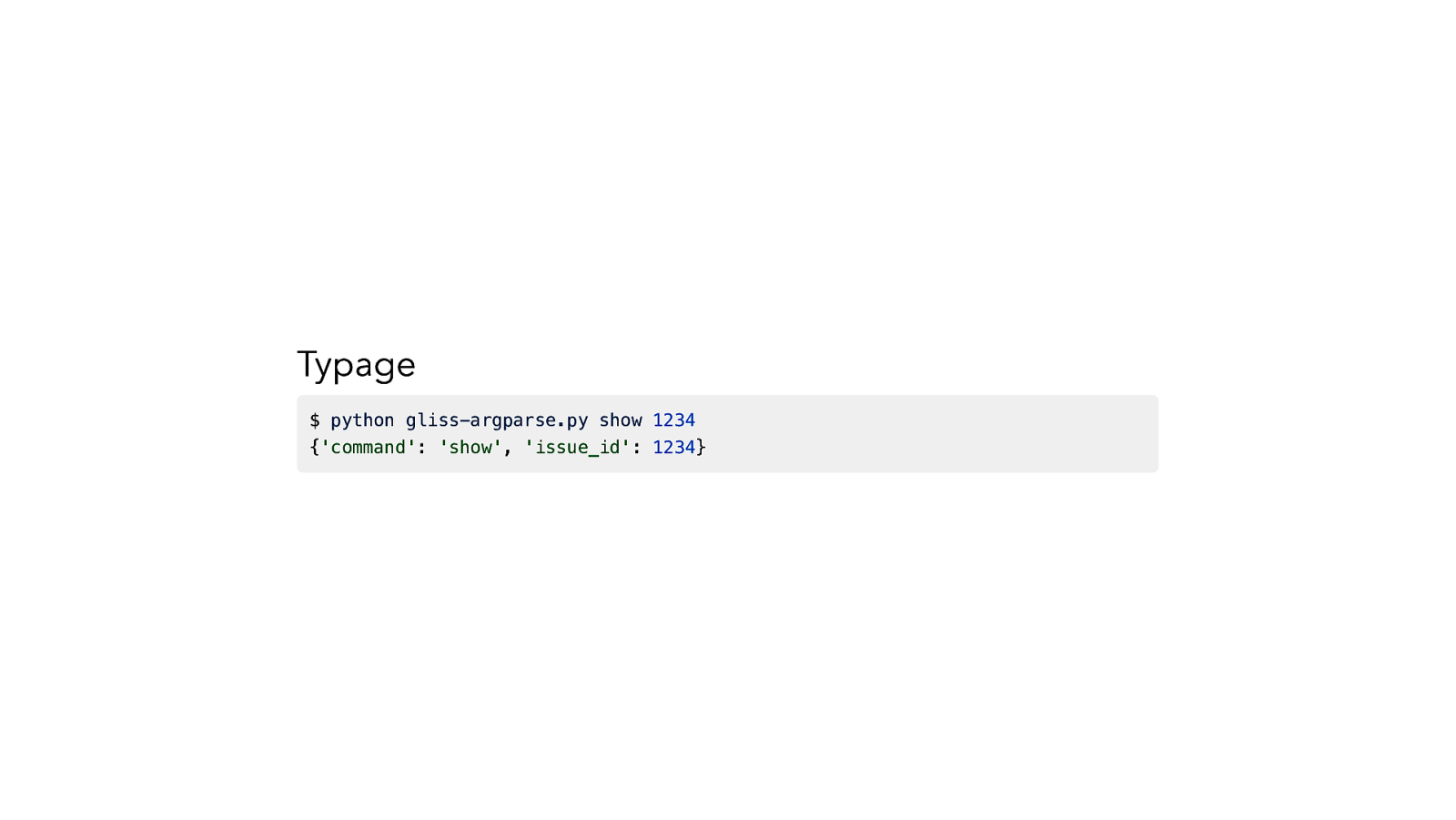
Typage $ python gliss-argparse.py show 1234 {‘command’: ‘show’, ‘issue_id’: 1234}

L’ancienne gloire : docopt proposé à pycon UK 2012 http://youtu.be/pXhcPJK5cMc 7.8k ⭐ Used by: 86k repos approche recommandée par la PEP 257 The docstring of a script (a stand-alone program) should be usable as its “usage” message, printed when the script is invoked with incorrect or missing arguments (or perhaps with a “-h” option, for “help”).

gliss-docopt.py “”“gliss - Command Line Interface to interact with GitLab Issues. Usage: gliss list gliss create <title> [—description=<description>] [—priority=<priority>] gliss show <issue-id> gliss close <issue-id> gliss comment <issue-id> <comment> gliss assign <issue-id> <assignee-name> Options: -h —help Show this screen. -d —description=<description> Description of the issue. -p —priority=<priority> Priority of the issue. Valid values are “Low”, “Medium”, “High”. “”” import docopt opts = docopt.docopt(doc) print(opts)
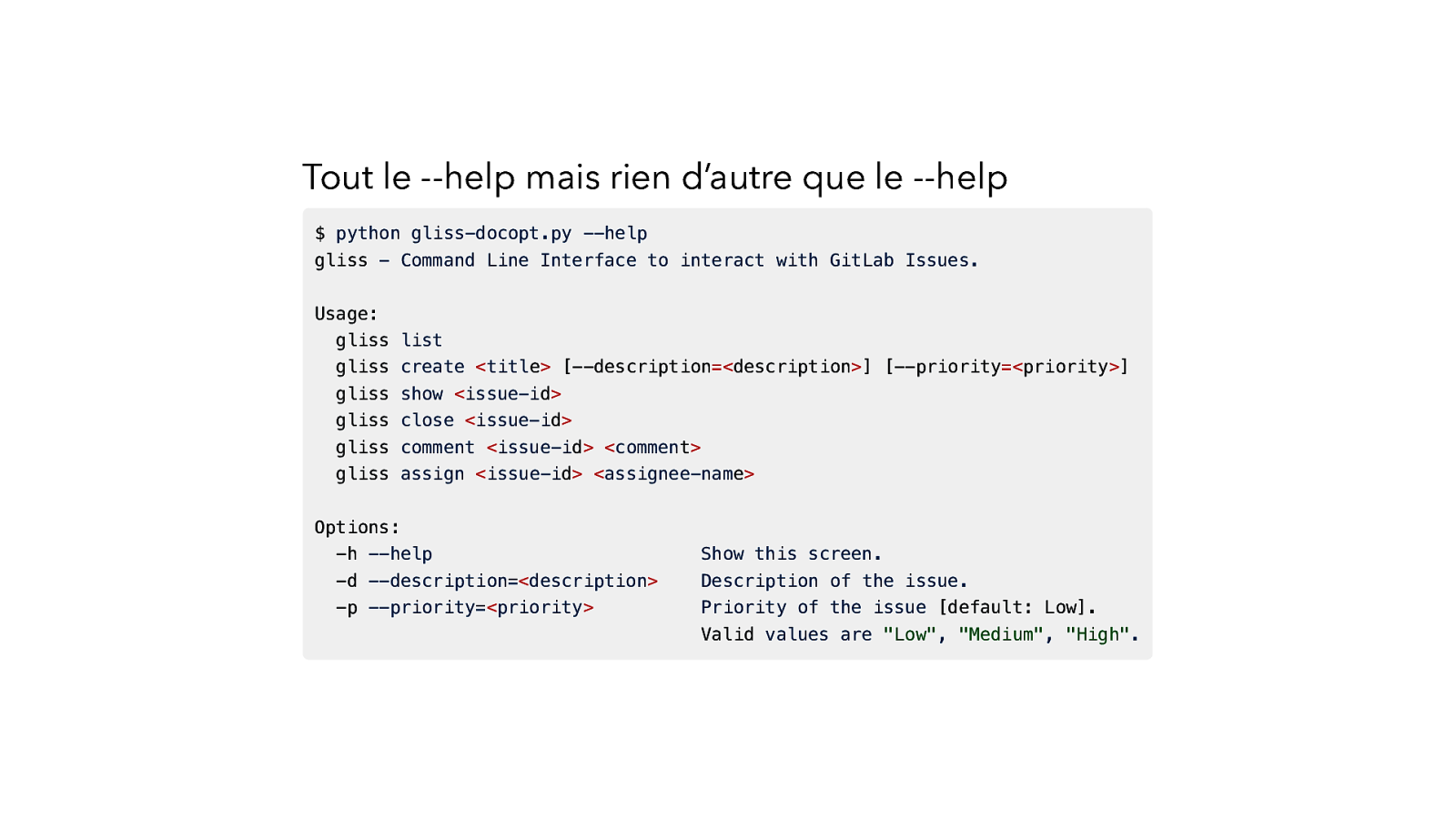
Tout le —help mais rien d’autre que le —help $ python gliss-docopt.py —help gliss - Command Line Interface to interact with GitLab Issues. Usage: gliss list gliss create <title> [—description=<description>] [—priority=<priority>] gliss show <issue-id> gliss close <issue-id> gliss comment <issue-id> <comment> gliss assign <issue-id> <assignee-name> Options: -h —help -d —description=<description> -p —priority=<priority> Show this screen. Description of the issue. Priority of the issue [default: Low]. Valid values are “Low”, “Medium”, “High”.

Pas d’aide spécifique par commande $ python gliss-docopt.py create —help gliss - Command Line Interface to interact with GitLab Issues. Usage: gliss list gliss create <title> [—description=<description>] [—priority=<priority>] gliss show <issue-id> gliss close <issue-id> gliss comment <issue-id> <comment> gliss assign <issue-id> <assignee-name> Options: -h —help Show this screen. -d —description=<description> Description of the issue. -p —priority=<priority> Priority of the issue [default: Low]. Valid values are “Low”, “Medium”, “High”.
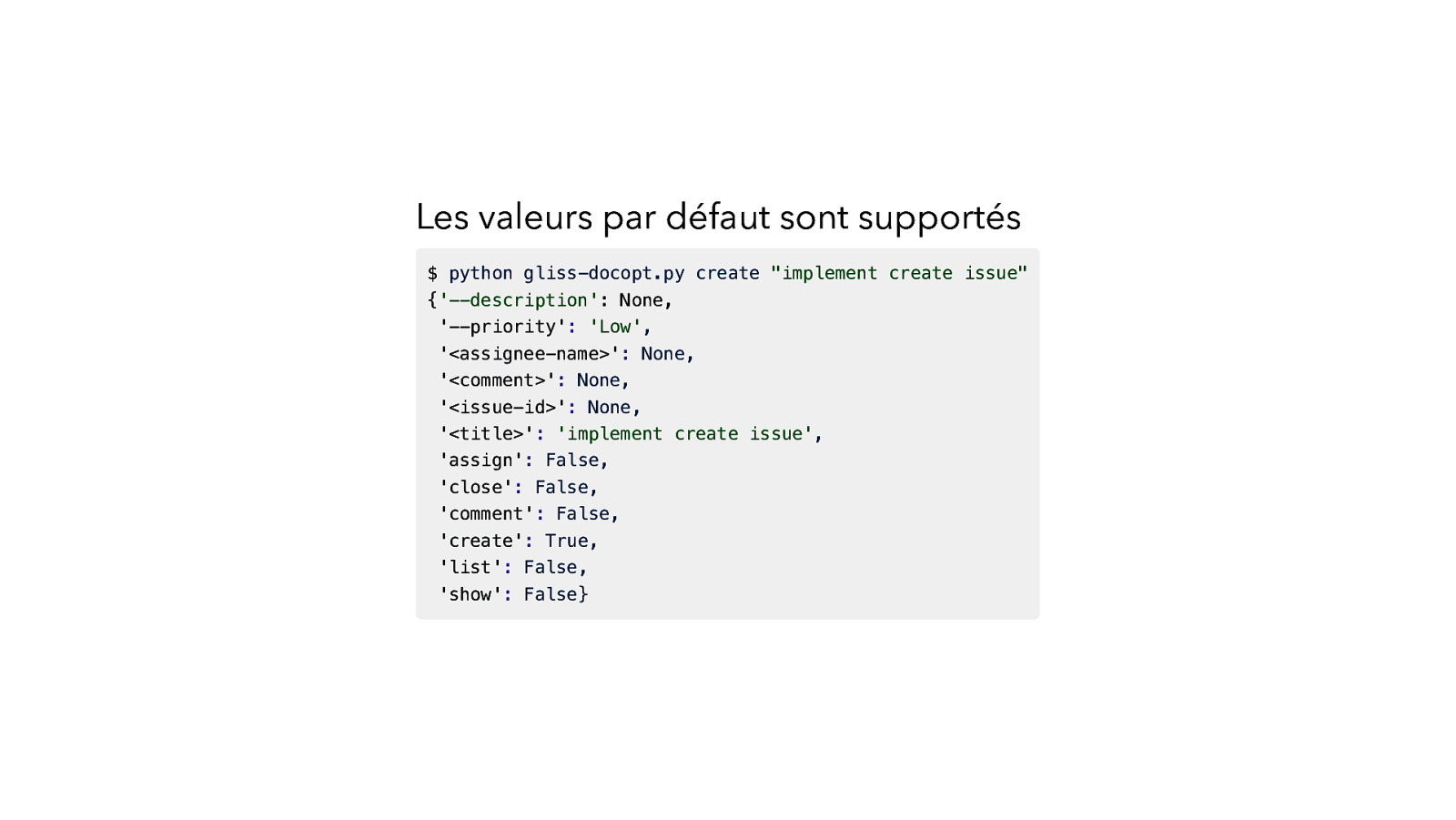
Les valeurs par défaut sont supportés $ python gliss-docopt.py create “implement create issue” {‘—description’: None, ‘—priority’: ‘Low’, ‘<assignee-name>’: None, ‘<comment>’: None, ‘<issue-id>’: None, ‘<title>’: ‘implement create issue’, ‘assign’: False, ‘close’: False, ‘comment’: False, ‘create’: True, ‘list’: False, ‘show’: False}
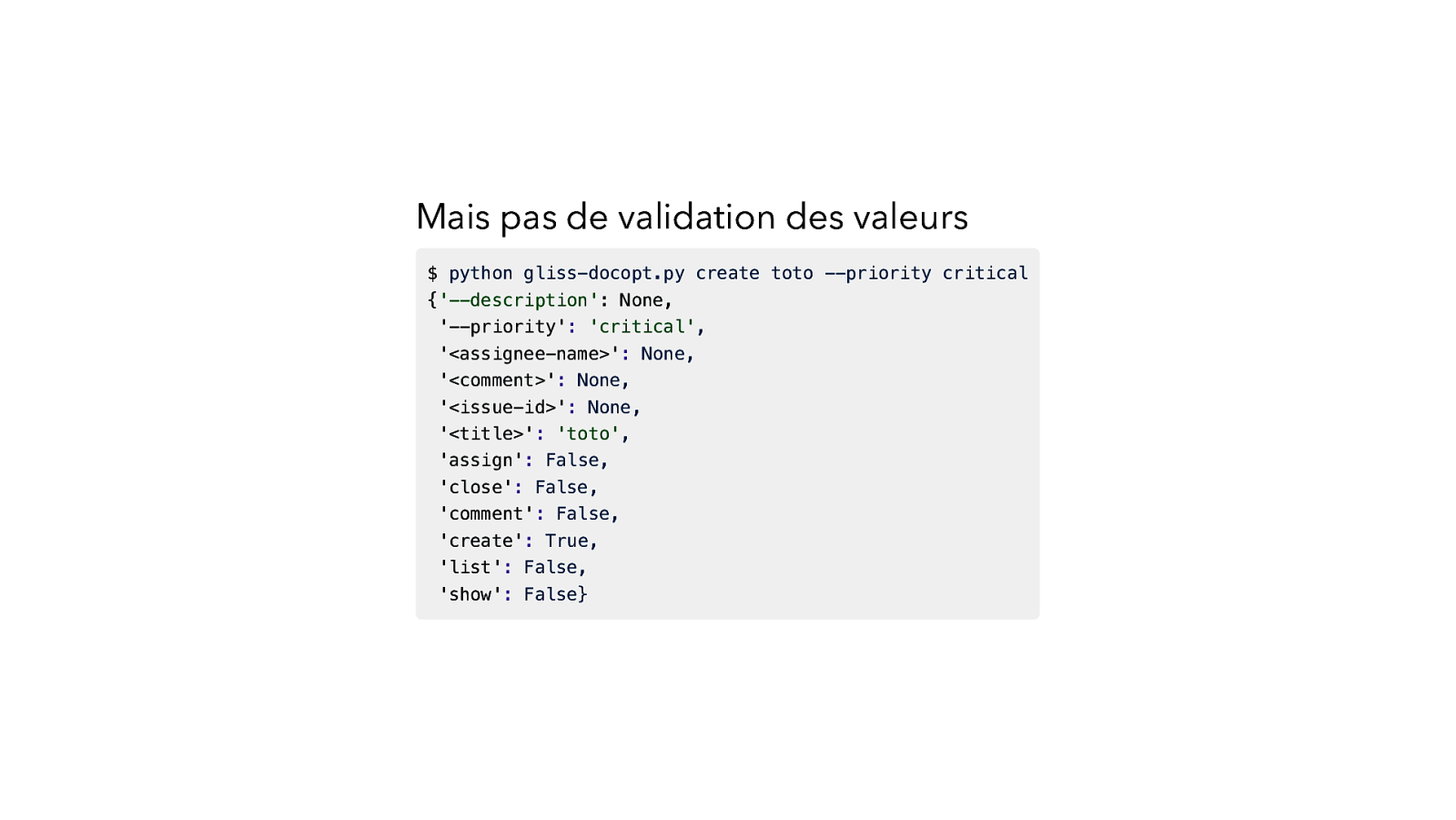
Mais pas de validation des valeurs $ python gliss-docopt.py create toto —priority critical {‘—description’: None, ‘—priority’: ‘critical’, ‘<assignee-name>’: None, ‘<comment>’: None, ‘<issue-id>’: None, ‘<title>’: ‘toto’, ‘assign’: False, ‘close’: False, ‘comment’: False, ‘create’: True, ‘list’: False, ‘show’: False}

comment ca va doc(opt) ? porté dans 23 langages le projet n’est plus maintenu depuis 2014 😢 il existe un fork par la communauté jazzband : docopt-ng

Le favori des bookmakers : click 13.6k ⭐ Used by: 1M repos créé par Armin Ronacher (flask, jinja, etc.) Typer par @tiangolo (fastapi)
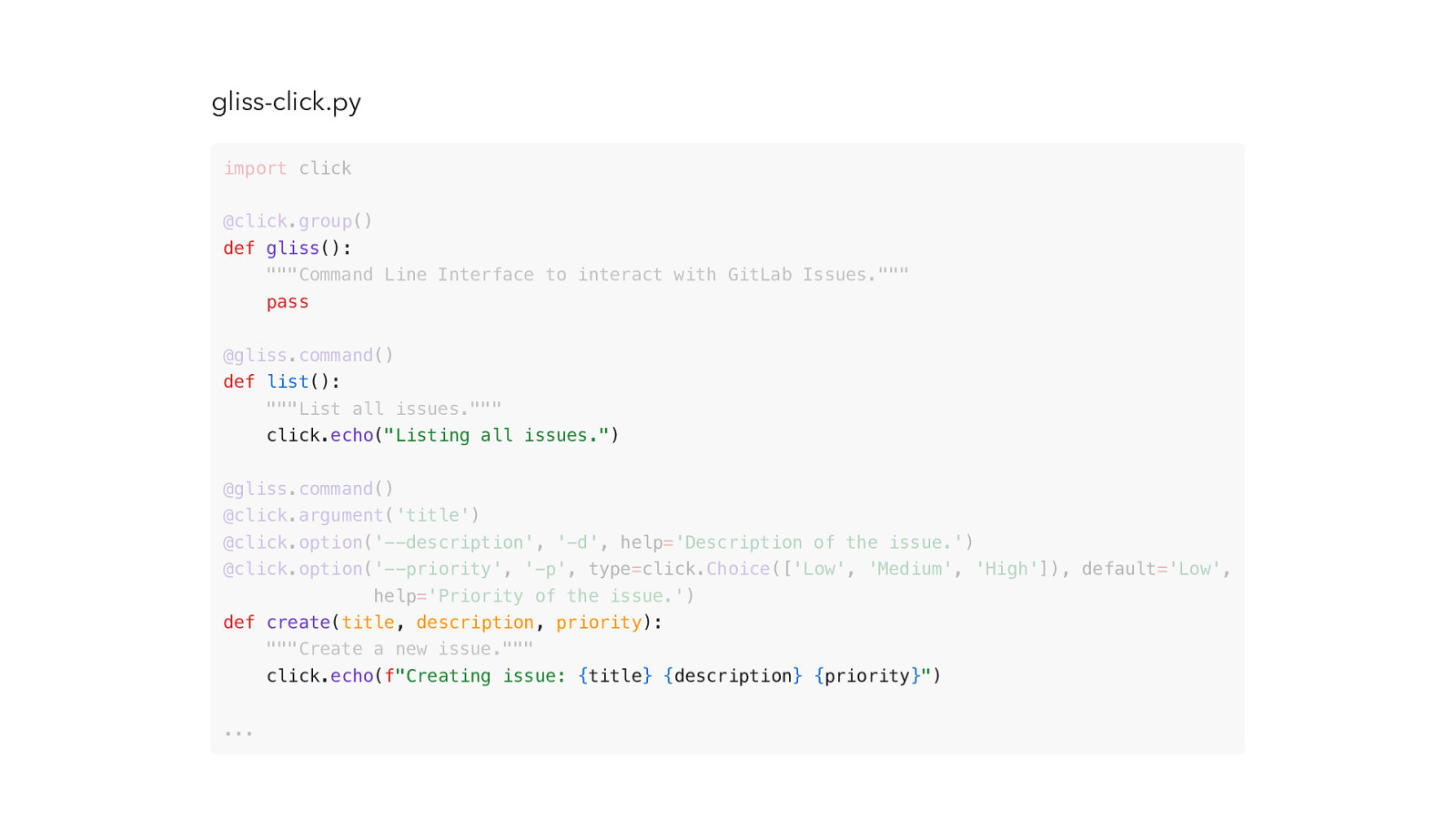
gliss-click.py import click @click.group() def gliss(): “”“Command Line Interface to interact with GitLab Issues.”“” pass @gliss.command() def list(): “”“List all issues.”“” click.echo(“Listing all issues.”) @gliss.command() @click.argument(‘title’) @click.option(‘—description’, ‘-d’, help=’Description of the issue.’) @click.option(‘—priority’, ‘-p’, type=click.Choice([‘Low’, ‘Medium’, ‘High’]), default=’Low’, help=’Priority of the issue.’) def create(title, description, priority): “”“Create a new issue.”“” click.echo(f”Creating issue: {title} {description} {priority}”) …
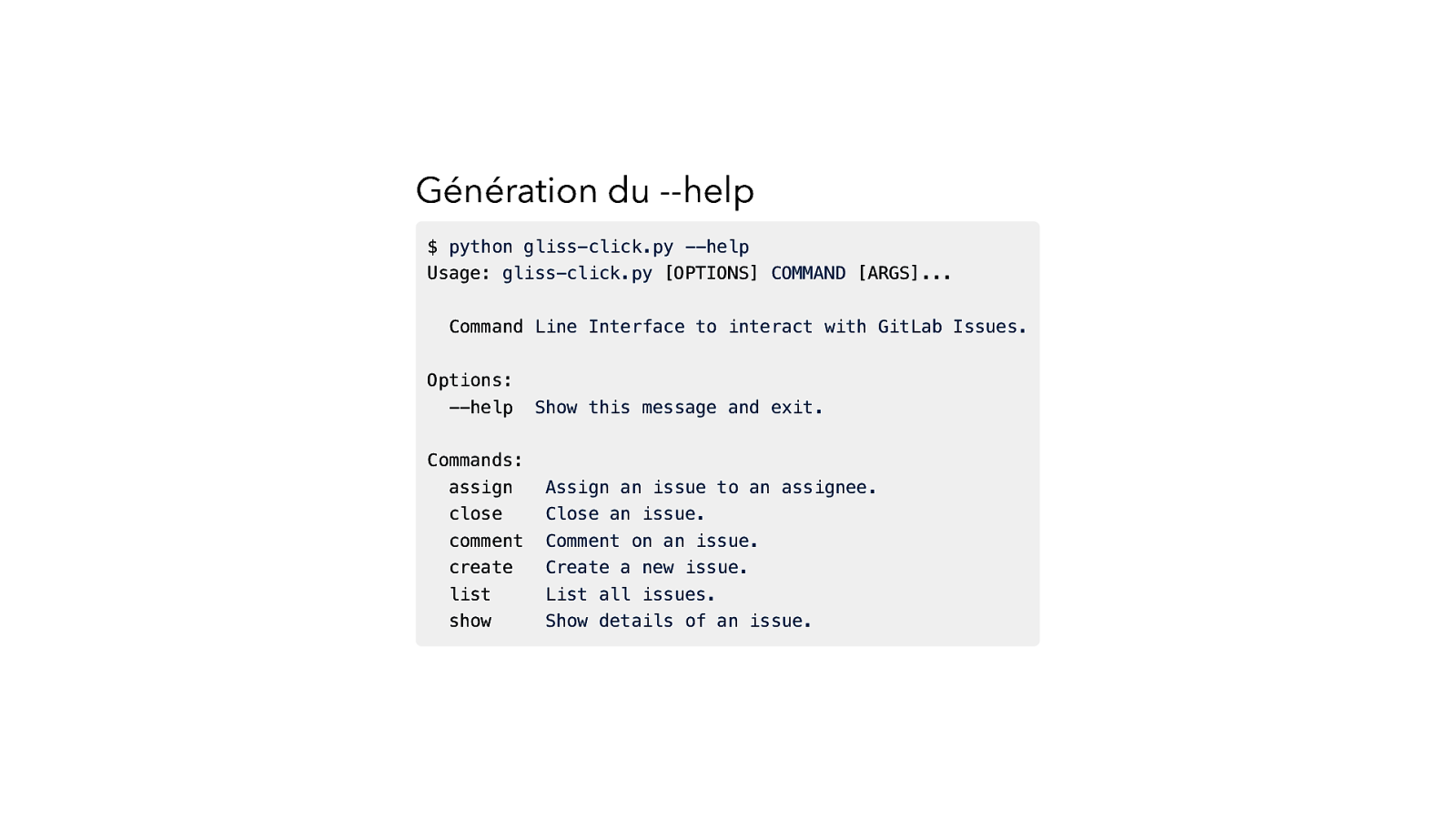
Génération du —help $ python gliss-click.py —help Usage: gliss-click.py [OPTIONS] COMMAND [ARGS]… Command Line Interface to interact with GitLab Issues. Options: —help Show this message and exit. Commands: assign close Assign an issue to an assignee. Close an issue. comment create list Comment on an issue. Create a new issue. List all issues. show Show details of an issue.
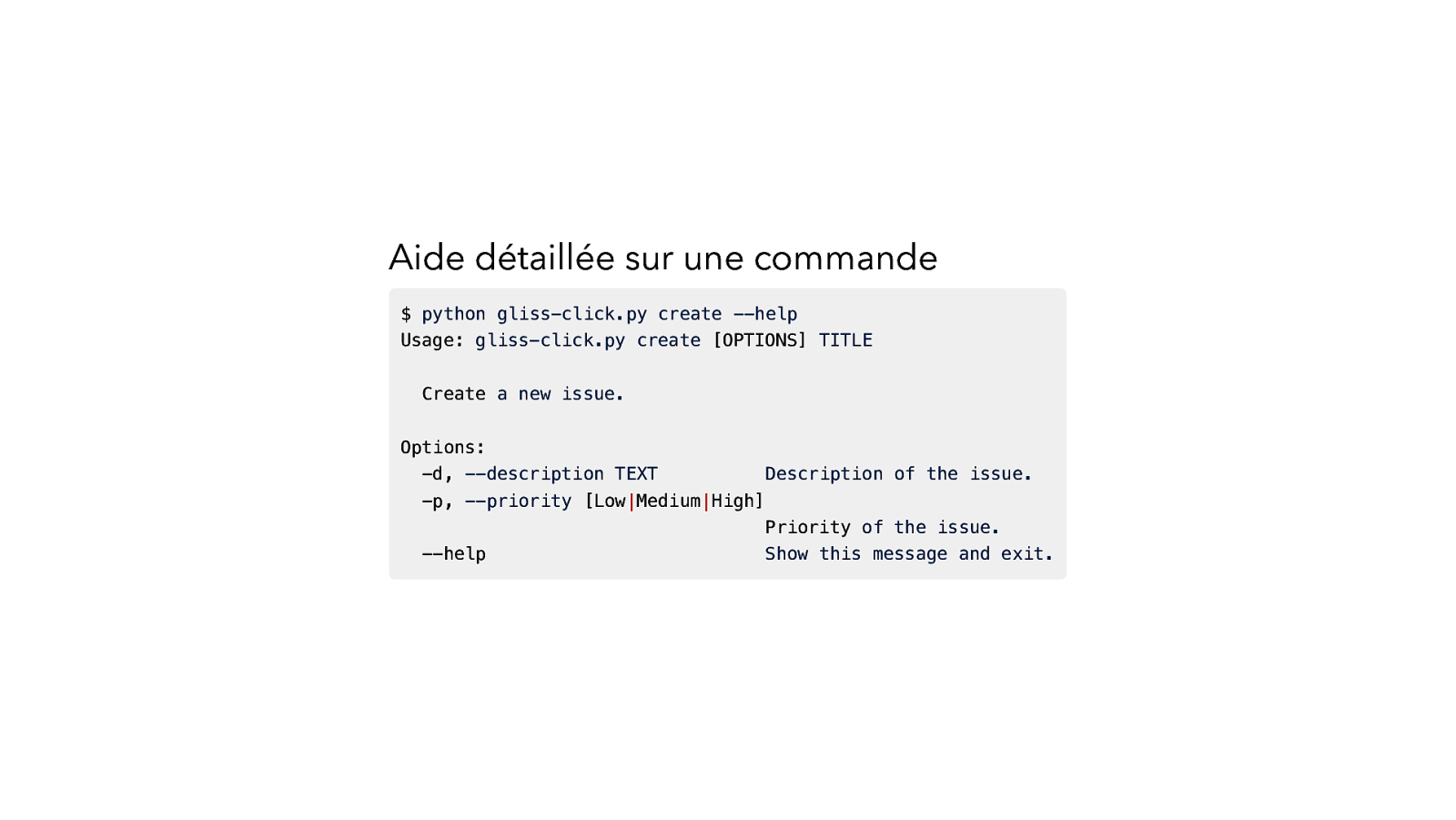
Aide détaillée sur une commande $ python gliss-click.py create —help Usage: gliss-click.py create [OPTIONS] TITLE Create a new issue. Options: -d, —description TEXT Description of the issue. -p, —priority [Low|Medium|High] —help Priority of the issue. Show this message and exit.

L’outsider : fire 24.2k ⭐ Used by: 18k repos porté par google
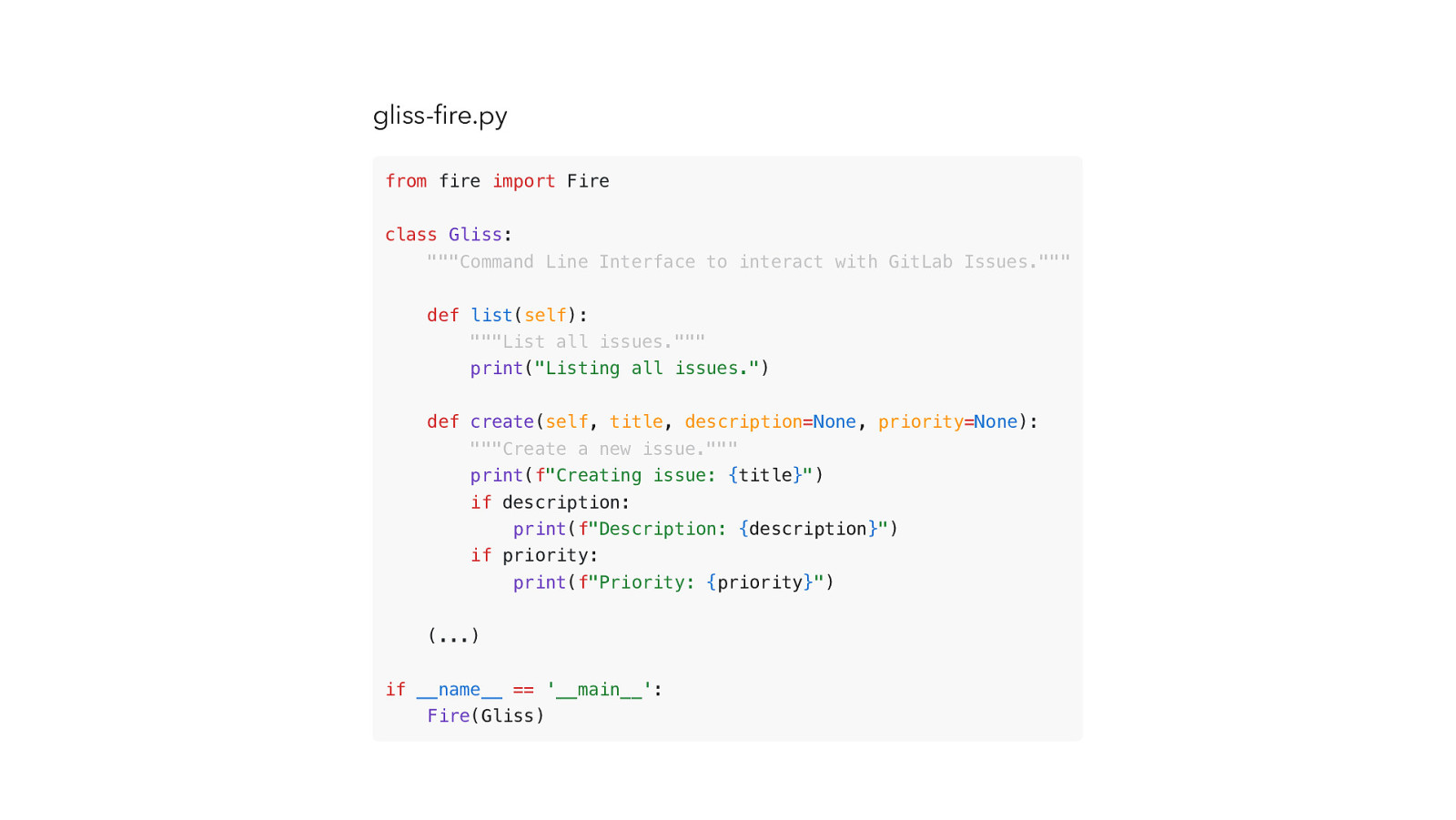
gliss-fire.py from fire import Fire class Gliss: “”“Command Line Interface to interact with GitLab Issues.”“” def list(self): “”“List all issues.”“” print(“Listing all issues.”) def create(self, title, description=None, priority=None): “”“Create a new issue.”“” print(f”Creating issue: {title}”) if description: print(f”Description: {description}”) if priority: print(f”Priority: {priority}”) (…) if name == ‘main’: Fire(Gliss)
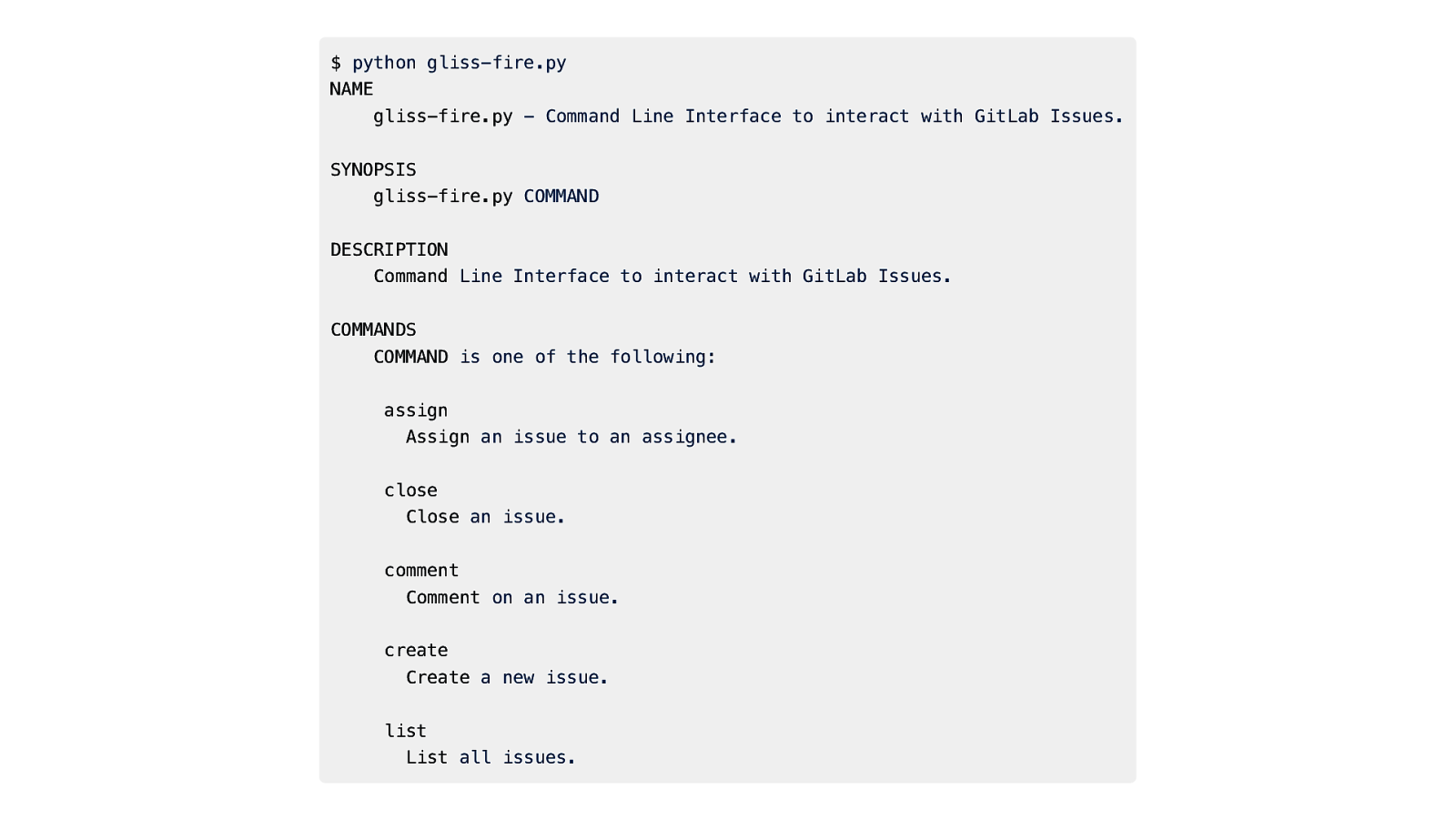
$ python gliss-fire.py NAME gliss-fire.py - Command Line Interface to interact with GitLab Issues. SYNOPSIS gliss-fire.py COMMAND DESCRIPTION Command Line Interface to interact with GitLab Issues. COMMANDS COMMAND is one of the following: assign Assign an issue to an assignee. close Close an issue. comment Comment on an issue. create Create a new issue. list List all issues.
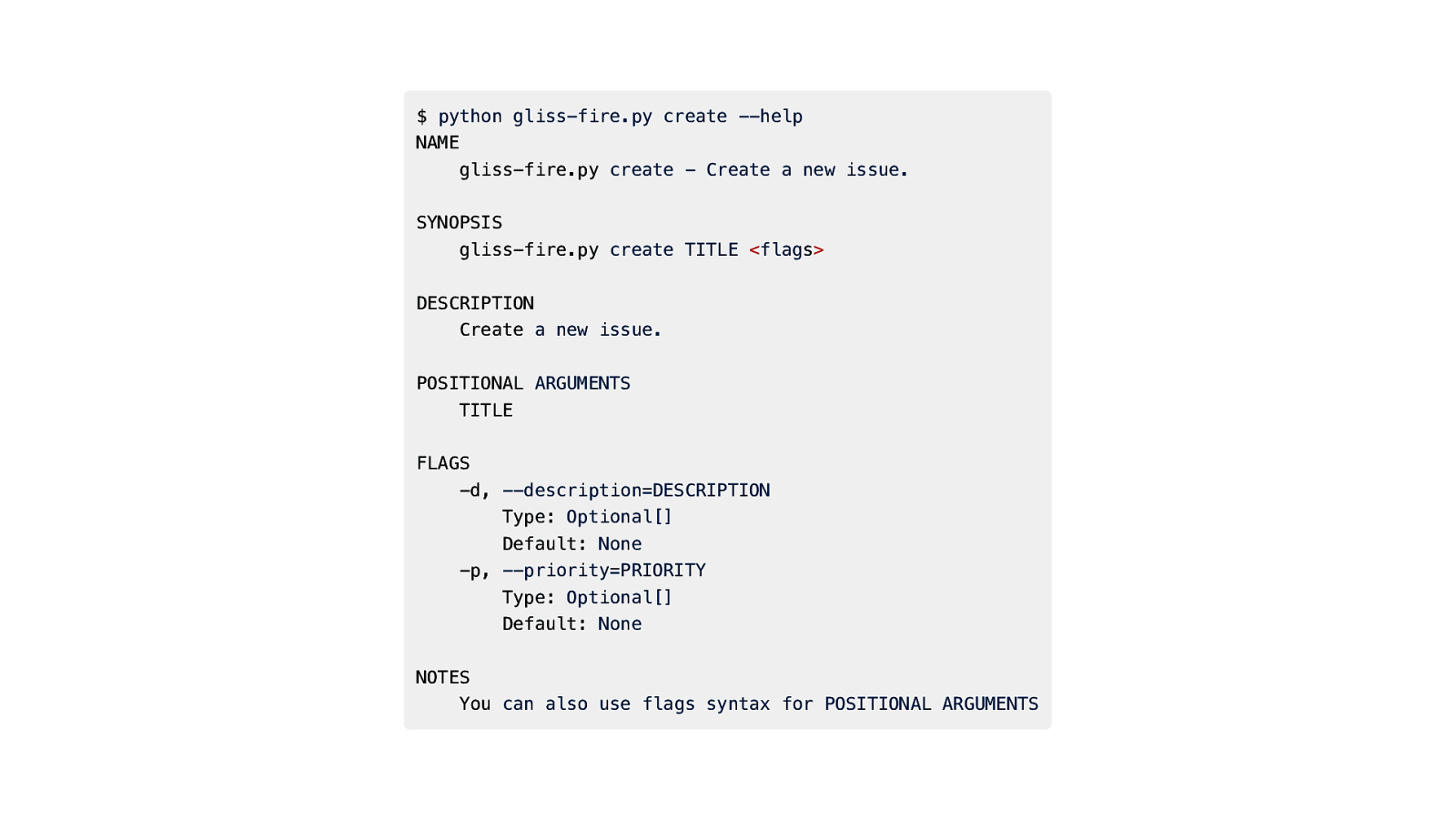
$ python gliss-fire.py create —help NAME gliss-fire.py create - Create a new issue. SYNOPSIS gliss-fire.py create TITLE <flags> DESCRIPTION Create a new issue. POSITIONAL ARGUMENTS TITLE FLAGS -d, —description=DESCRIPTION Type: Optional[] Default: None -p, —priority=PRIORITY Type: Optional[] Default: None NOTES You can also use flags syntax for POSITIONAL ARGUMENTS

Conclusion : une diversité d’approches
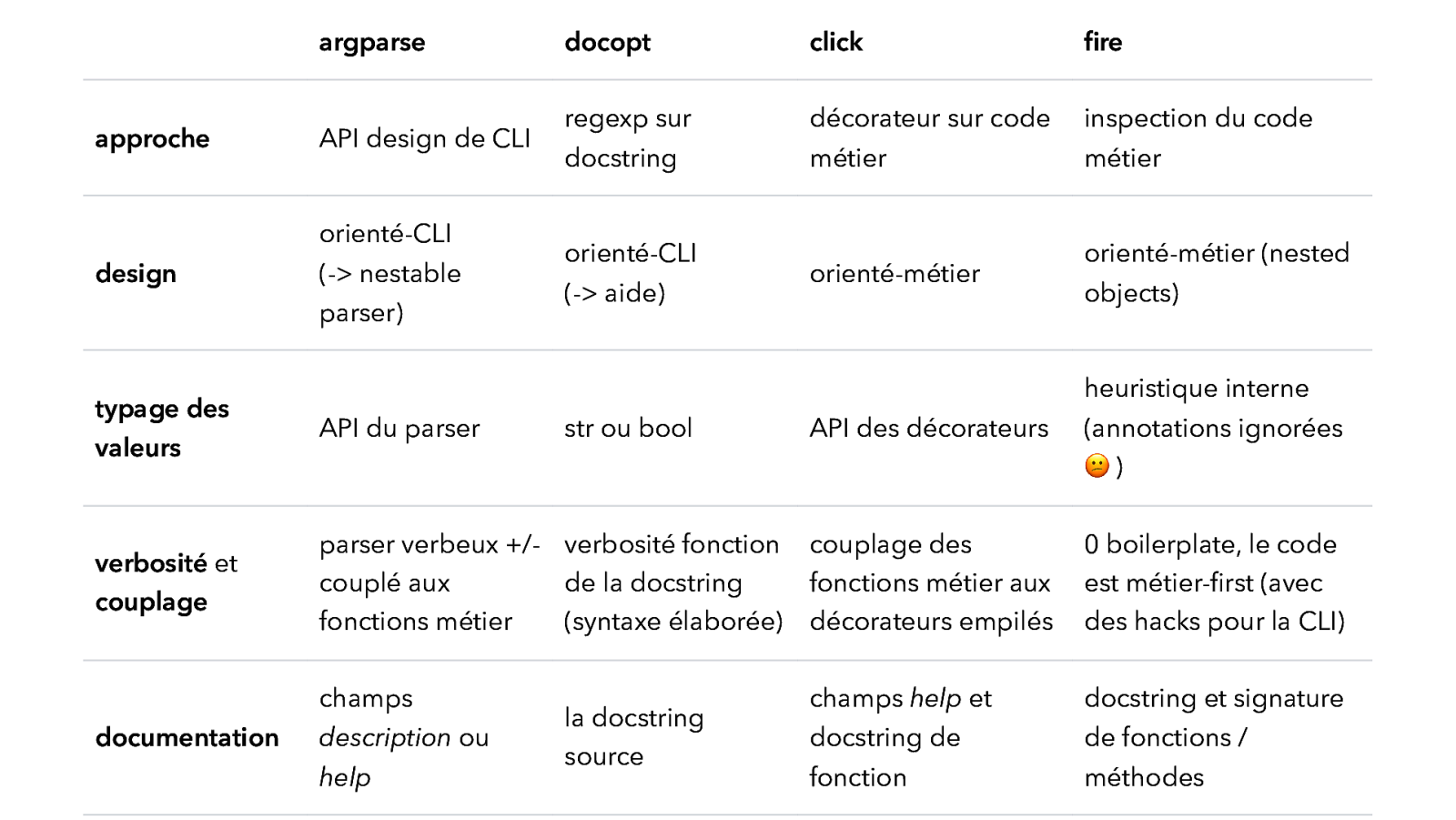
argparse approche API design de CLI orienté-CLI design (-> nestable parser) click fire regexp sur décorateur sur code inspection du code docstring métier métier orienté-CLI (-> aide) orienté-métier orienté-métier (nested objects) heuristique interne typage des valeurs API du parser verbosité et couplage documentation docopt API des décorateurs (annotations ignorées ) parser verbeux +/- verbosité fonction couplé aux de la docstring fonctions métier (syntaxe élaborée) couplage des fonctions métier aux décorateurs empilés 0 boilerplate, le code est métier-first (avec des hacks pour la CLI) champs description ou champs help et docstring de docstring et signature de fonctions / fonction méthodes help str ou bool la docstring source 😕

Merci !
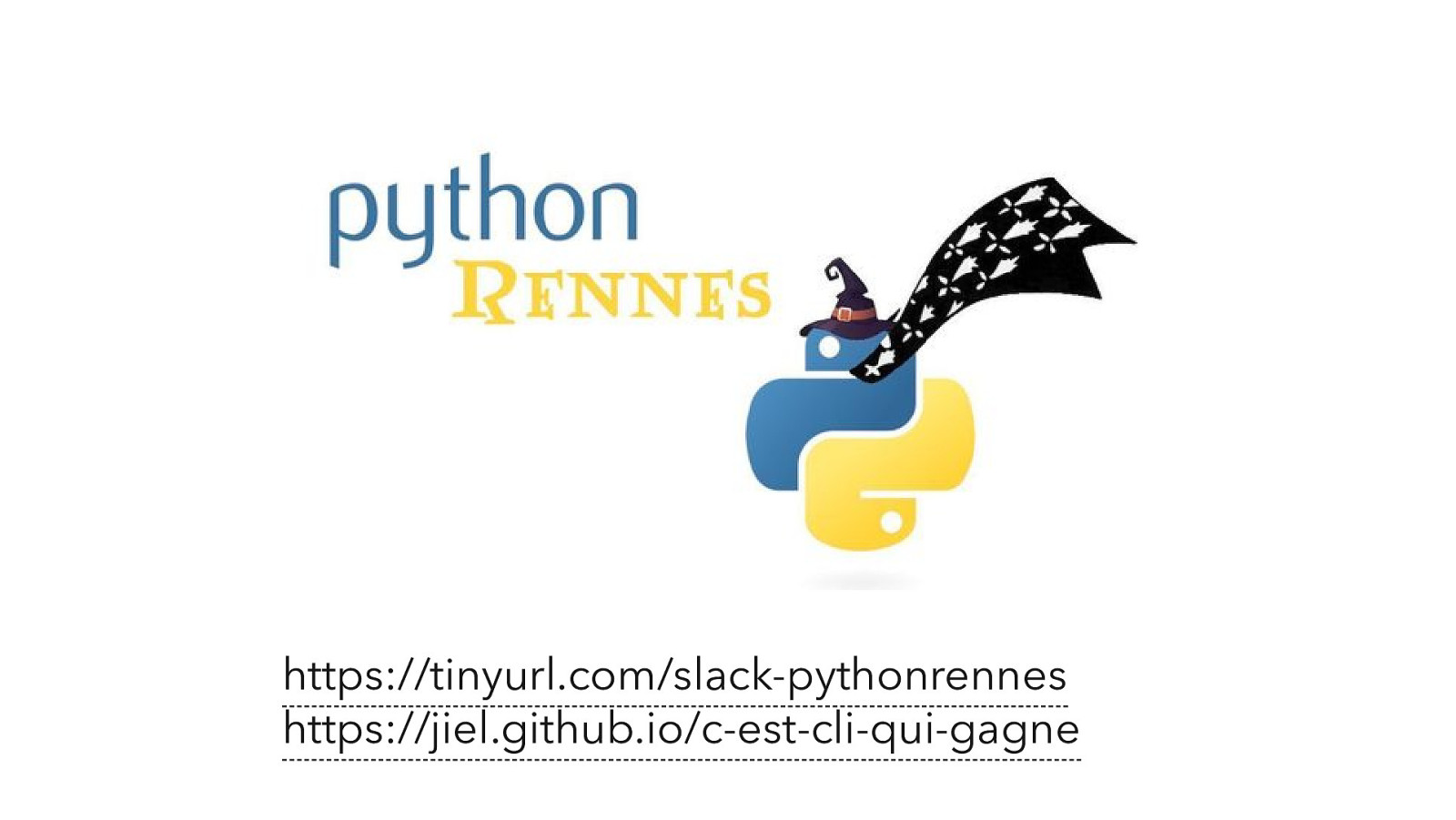
https://tinyurl.com/slack-pythonrennes https://jiel.github.io/c-est-cli-qui-gagne